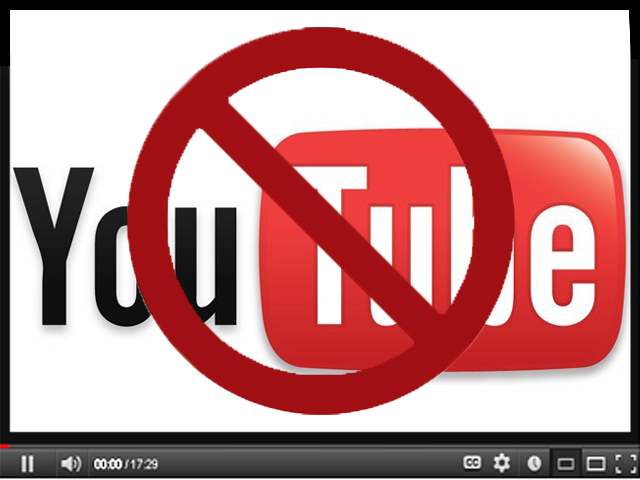
LAHORE: Farieha Aziz, amicus curiae on a case challenging the ban on video sharing website YouTube, told the Lahore High Court that a number of students and other internet users were suffering in Pakistan ever since the website was blocked in the country after the release of a blasphemous video.
Farieha Aziz, director of Bolo Bhi, was speaking before the Lahore High Court in a petition challenging the ban on YouTube.
Stressing upon the need to reopen access to YouTube, Aziz said that there were 13,049,489 views on YouTube for videos from just six educational institutions in Pakistan that used the website to place their video lectures. The institutions included the Virtual University of Pakistan, The Institute of Chartered Accountants Pakistan, Lahore University of Management Sciences, Quaid-i-Azam University Islamabad, National University of Sciences and Technology, she said.
She said that various Pakistani universities maintained their own YouTube channels on which they posted videos related to academics and school activities. The videos benefit not just students enrolled at specific institutes, but anyone with access to YouTube, she said.
Aziz said that the total number of views for Islamic and educational content on YouTube were 1,199,368,564, while the total worldwide views of the objectionable film, The Innocence of Muslims, on YouTube were 1,965,186, just 0.164 percent of the former.
Additionally, she said that more than one billion unique users visit YouTube each month to watch six billion hours of videos that belong to different categories, most of which contribute to knowledge acquisition.
She said that 70% of that traffic and viewership was from outside of the United States.
Aziz submitted the information under title of ‘Internet Usage Study’ carried out by Bolo Bhi within a period of six days.
Aziz added that YouTube was used by students in Pakistan as a tool to supplement their academics.
She said that YouTube hosted a diverse range of available content from lectures to seminars, and “how to” videos to documentaries posted by professionals such as TEDTalks and National Geographic. The leading universities in the world also had their own YouTube channels where they post subject-related content, she said.
Giving details of the study, Farieha said that Bolo Bhi conducted the study from July 26 to July 31 on the use of internet in Pakistan, in particular the use of video-sharing platforms. The survey received 250 responses of which 41.60% were students, the highest in number. These were followed by professionals, those employed, entrepreneurs and self-employed, that represented 43.20% of the respondents. Twelve percent were from the media and the academia, while the remaining 3.2% included government and law enforcement officials.
She said that the educational use of YouTube (82.8%) was higher than that of its use for entertainment, which was 76.8%.
Aziz also submitted four letters from different people to the court. The first letter was from the owner of ToffeeTv.com, an entrepreneurial online venture by a team of young women based out of Karachi who develop songs, stories and activities for children between the ages of 0-12 in Urdu.
The second letter was by an IT consultant who had previously been involved in drafting policies on IT and Telecom for the government. In his letter, he indicates the danger in relying on proxies to access YouTube and other banned websites, as they left one’s machine open to viruses and malware.
The fourth letter was by a driver by profession, who had access to a computer that his employer owned, stating that he used YouTube to catch up on the news of the day. The letter stated that even though he could not read or write English, he had no difficulty in operating a computer or accessing YouTube, before it was blocked. Each of the four were suffering like many others after YouTube was blocked, she said.
A meeting was held between Bytes for All, the petitioner, and Pakistan Telecommunication Authority on the instructions of the LHC to explore possible technical solutions for blocking and unblocking of the URLs of objectionable content.
Experts of the Ministry of Information Technology, PTA, PTCL, Trans-world Associates, Center for Advanced Research in Engineering, and Internet Service Providers Association of Pakistan attended the meeting.
It was concluded that there were two cable landing station operators in Pakistan, PTCL and TWA, whose traffic did not converge at one single point. Therefore, any blocking efforts would have to be carried out by both operators respectively. The two landing station operators and all major internet service providers were capable of managing and blocking ‘blasphemous’ URLs, once identified, manually.
PTA’s representative stated in the meeting that there was no system within Pakistan that was capable of blocking the trailer to The Innocence of Muslims video without disrupting other internet traffic.
COMMENTS (16)
Comments are moderated and generally will be posted if they are on-topic and not abusive.
For more information, please see our Comments FAQ





























































@Chunky Lafanga: In reality, there is nothing called "freedom of speech" with no limit in this world.. there are always limits... and how about the freedom of speech when it comes to "Jews." Double standards? People like your fall in the same category as extremists... trying to impose your version of life on the whole world.
@AQ:
Why should Google have to play by our irrational government's terms? The purpose of YouTube is neither education nor entertainment. It's simply a platform to share user-generated videos easily and for free, with freedom of speech being at the foundation of it.
I'm at work so I'd rather not do it myself right now, but I'm sure you can find a plethora of videos by "Muslims" denouncing other religions and blaspheming against them. Double standards much?
@Chunky Lafanga:
The purpose of youtube isn't education, it's almost an entertainment portal. If google doesn't want to play on our government terms, then youtube should remain banned for eternity.
None of scholars refuted or questioned the correctness of blasphemous small 13 mts. movie as reaction of which the youtube banned. Allama Tahirul Qadri and other scholars are still uploading videos of their lectures on youtube.
Who says you tube ban? There are a dozen of software like Hot Spot shield etc that bypasses the ban. Perhaps the writer is ignorant of these software. Every You Tube buff is watching it. Wake up man.
Really good work by Bolo Bhi. This is exactly the kind of data needed for informed decision making. The court should protect the public from arbitrary actions of the government which infringe upon our right to information and expression.
@Mubeen Abbas: The latter headline in your message is actually the correct one. The pause after "court told" won't make any sense.
The ban on You Tube has made it difficult for our students to access relevant course vidoes. Home Tutors also used You Tube a lot to grab new ways to tutor students.
@Shamy:: youtube is banned.I have no access to your query.I 'suppose',rather I guess that she is the sister of Marie curie
Amicus curae is a friend of the court. Not part of the case but an outsider looking in and concerned about the merits
@AQ: The difference being that gangnam style doesn't make one religious group want to murder another.
ET, please correct your use of comma in English.
I think it should be: "Court told, students and others suffering from YouTube ban"
and not:
Court told students, others suffering from YouTube ban
Atleast some one with sense..took the matter to the court..nice work..
Ban should be immediately lifted. We cannot be made slaves to the wishes of Mullahs
//total number of views for Islamic and EDUCATIONAL content on YouTube were 1,199,368,564//
...and gangnam style has got more than 1.7 billion hits.
Holy Schnikes, how many "Youtube is Still Blocked" Stories does ET have to do every day?? This is the third or the fourth one today... let it go guys, Its not being unblocked anytime soon.
Even the literates wouldn't know what "amicus curiae" means. ET please simplify your language.